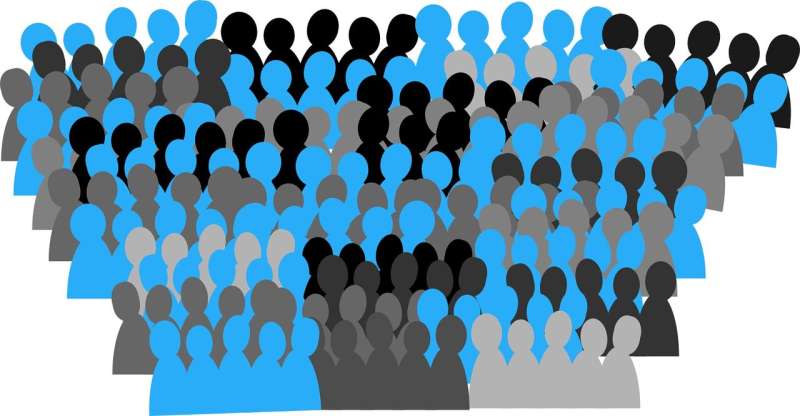This article has been reviewed according to Science X's editorial process and policies. Editors have highlighted the following attributes while ensuring the content's credibility:
fact-checked
trusted source
written by researcher(s)
proofread
People love to vote in a new democracy—and then they rapidly lose interest

Poland's recent election has been hailed as a great triumph of democracy in a global environment of democratic backsliding. It brought to power a coalition of pro-democratic forces led by Donald Tusk, the former president of the European Council.
This election was also considered a historical landmark because it saw Poland record its highest voter turnout since 1919. Participation was even higher than the election that cemented the fall of Communism, paving the way for democracy in the first place.
Yet this election seems to be an outlier. Patterns of voter turnout over several decades have shown a systematic and consistent decline. And this decline is much more accelerated in new democracies, such as those that have transitioned away from communism following the end of the USSR.
This pattern is puzzling. We might expect enthusiasm for democratic transitions to boost voter turnout. Citizens who have ached to exert their democratic rights during a long period of political repression might naturally head out to the polls in their droves.
In the immediate term, this is the case. The euphoria and enthusiasm of the democratic transition can lead to higher turnout in a new democracy's first election after transition.
I've examined electoral turnout in 1,086 elections across 100 countries between 1946 and 2015 and found that turnout in the first election after a democratic transition is about three percentage points higher than other elections (in new and established democracies).
But the high turnout rate in the first election is a short-term phenomenon. The rate of participation in new democracies drops consistently as more elections are held.
Tunisia is a prime example. The turnout in its first parliamentary free election in 2011 after the fall of dictator Zine El Abidine Ben Ali was over 90%. But once the complicated realities of building democracy set in, turnout tumbled dramatically.
Wrangling over institutional design and the redistribution of political power and resources meant that excitement dissipated and was replaced by disappointment with democracy. Tunisians lost their faith in the ability of political actors to keep democracy alive. Participation declined sharply in this period. In the most recent election in 2023, turnout barely reached 11%.
Rapid disillusionment
The plummet in voter turnout that new democracies experience could be explained by voters rapidly becoming disillusioned with the reality of democracy. That's not to say they'd return to the undemocratic systems of their past but that they don't feel enthusiastic enough to go to the polling station on election day.
In the first election after the transition to democracy, also referred to as the founding election, a country's electoral politics naturally focuses on pitting opponents and supporters of the former autocracy against those who wanted to overthrow it. But that soon evolves into something more mundane—regular electoral politics in which parties compete over voters based on partisanship, ideology or policy preferences.
In other words, the binary choice between autocracy and democracy excites voters, while the choices of regular electoral politics may increase apathy among voters. More simply, voters in new democracies may not be used (yet) to the complicated reality of elections in democracy.
Young revolutionaries become active voters
The evidence suggests that the way in which a country transitions to democracy plays a part in the political attitudes and behaviors of its citizens. Transitions driven by non-violent, mass mobilization have the potential to socialize people into developing more pro-democratic attitudes. This is perhaps because citizens are made aware of their power to influence politics via participation and therefore become active participants in politics afterwards.
My research, which used survey data to capture electoral turnout among 1.2 million respondents from 85 democracies between 1982 and 2015, shows that this is a more powerful force among people who experience the transition to democracy during their formative years.
Those who transition to democracy between the ages of 15 and 29 are two percentage points more likely to turn out to vote later in life compared to those who experienced the transition outside their formative years or voters from established democracies that never experienced a transition. People who experienced a transition to democracy after they turned 30 were less likely to turn out to vote in new democracies.
The transition may have socialized the first cohort into being more pro-democratic because younger people are more likely to participate in protests—and experience the violent consequences of doing so. They are also more receptive to unorthodox ideas that challenge old forms of power.
The different experiences of the older cohort may suggest the socializing effect of democratic transitions may not be able to fully replace the socialization experience of living under autocracy. Being socialized in an environment in which political participation is discouraged and strictly regulated by the government creates habits of disengagement from politics that may not be fully reversed by the excitement of experiencing a democratic transition.
The global decline in voter turnout, particularly in new democracies, is a worrying sign for the health of democracy. These findings suggest that countering this trend means encouraging people to see participating in democracy as being as important—and exciting—as overthrowing a dictatorship.
Provided by The Conversation
This article is republished from The Conversation under a Creative Commons license. Read the original article.![]()



















